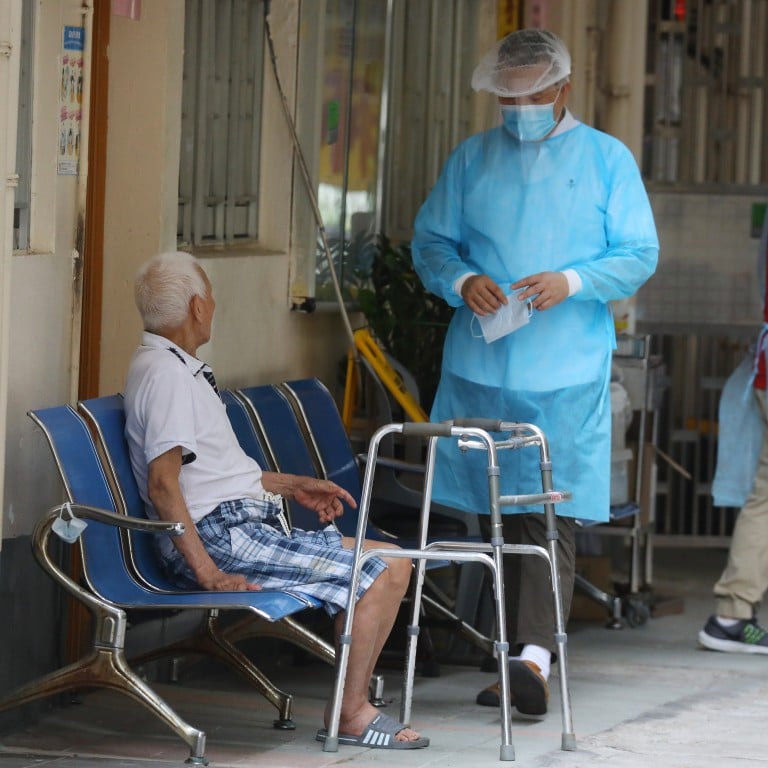
Coronavirus Hong Kong: ‘closed-loop’ system for care home staff optional, welfare chief confirms
- Minister concedes arrangement would be difficult to implement and focus will be on keeping about 80 facilities virus-free
- Comments by Law Chi-kwong come after city leader said care homes would be required to restrict employees’ movements
Secretary for Labour and Welfare Law Chi-kwong on Thursday said that ideally all employees of a care home would work under the closed-loop system but he admitted the limitations of the arrangement made it difficult.
“We strongly urge staff of care homes to take part in the closed-loop arrangement,” Law said. “But we understand that some staff may need to look after families after work. So it is difficult to make the arrangement mandatory.”
Chief Executive Carrie Lam Cheng Yuet-ngor announced on Wednesday that the arrangement would be implemented in facilities for the elderly and disabled, with staff given designated hotel accommodation and transport to their workplaces, isolating them from the wider community.
Operators of care homes said on Thursday that the government had already contacted them about participating initially for one month, after which the authorities would review the scheme.
Authorities resorted to the strategy after the surging fifth wave of the pandemic ripped through facilities. Overall, 722 elderly care homes have recorded cases, with 22,070 residents and 5,880 staff infected. Some 248 care homes for the disabled have also recorded cases, with 5,900 residents and 2,220 staff infected.
Law said that unlike in mainland China, Hong Kong’s care facilities did not have room for on-site accommodation for staff and their families.
“We can never achieve 100 per cent. It is a question of risk management – the lower the risk the better,” he said. “If 99 per cent of workers are engaged in it, it’s not risk-free, but the risk will be greatly reduced.”
Hong Kong care homes to adopt ‘closed-loop’ system to curb coronavirus outbreaks
About 80 care homes have managed to avoid infections and the government’s priority was to protect them from outbreaks, he added.
Some staff were already living in designated hotels and the government would continue to look for others, the minister said.
Apart from the closed-loop approach, authorities are providing temporary dormitories erected in vacant areas outside some care homes to accommodate staff, he noted.
Many facilities had also adopted flexible arrangements similar to a closed-loop system, such as allowing staff to stay in conference or activity rooms, Law said, adding the government could help facilities that lacked such options find hotel rooms for workers.
Authorities had also adopted “reverse isolation” in care homes – moving uninfected residents into infection-free facilities, with two being used for this purpose, he said.
Dr Lam Ching-choi, a member of Lam’s de facto cabinet and chairman of the Elderly Commission, said he believed authorities had taken into consideration the family needs of care workers and their views to avoid more employees quitting should the closed-loop system have been made mandatory.
“But considering there were only a few homes left without infections, the impact of the approach will not be significant,” he said.
Compared with care homes that were virus-free, facilities suffering outbreaks would have a bigger demand for designated hotel accommodation for staff who were more willing to stay outside their residences as they were concerned about spreading the virus to family members. Lam said. He suggested the government also provide support for them.
Covid-19 crisis at Hong Kong’s care homes: a disaster waiting to happen
Kenneth Chan Chi-yuk, chairman of the Elderly Services Association of Hong Kong, said care homes would weigh the views of their employees on the closed-loop system, and ask authorities for hotel accommodation and transport for those who were willing to take part.
But he said if a facility had only a handful of staff willing to join the scheme, it would be pointless to sign up as no closed loop would exist.
“In general, not many care homes are able to run under the closed-loop system,” he said.
Cheng Ching-fat, secretary of the Community Care and Nursing Home Workers General Union, said the government was right in making the closed-loop arrangement voluntary. He estimated that as many as nine in 10 care workers would not be willing to take part in the arrangement, as many had families to care for. But he expressed concern that care homes would press their staff to comply with the model.
Meanwhile, Law revealed the first batch of temporary care workers from the mainland had started working, while the second batch was under training. The government earlier said it intended to import 1,000 mainland carers to alleviate the manpower shortage.

